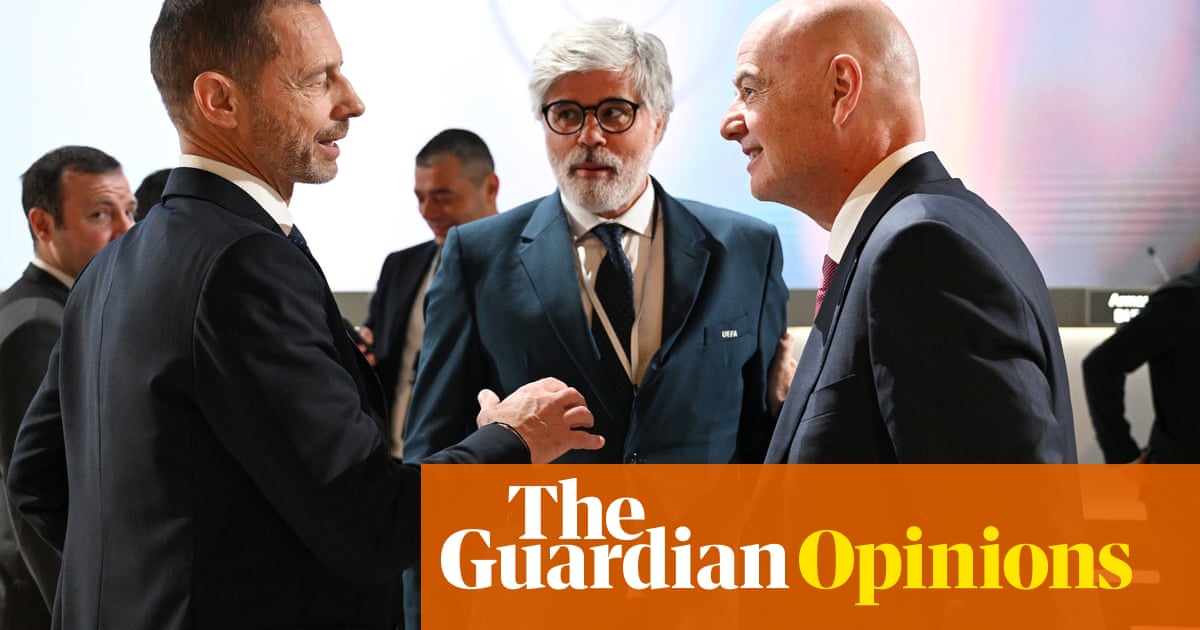In regal Odeonsplatz, the finishing touches are being applied to a fan zone that will accommodate Inter’s travelling fans under an azure sky. It will surely be full to capacity given about 40,000Nerazzurriare expected to arrive in time for Saturday’s Champions League final, even if under half that number will officially make it into Allianz Arena for the match itself. This is not only an appointment with history for their opponents, Paris Saint-Germain; Inter have blended silk with street-fighting qualities to stand on the verge of theirfirst European title since 2010.
Gianni Infantino is unlikely to be among the melee but theFifapresident’s sympathies are well documented. He will be quietly rooting for Inter from the VIP seats and perhaps it will be an opportune moment for some bridge building. There is a constituency of Inter fans in Uefa’s higher echelons, after all, and football’s biggest governing bodies could certainly do with discovering a few acres of common ground.
Surface temperatures have, at least, cooled since a number of European delegates at the Fifa congress walked out this month in protest at Infantino’s prioritising of meetings in the Middle East. A conciliatory public statement fromUefasaw to that, although nobody should assume all is forgiven behind the scenes. There is little love lost between their respective leaderships and the summer ahead is only likely to intensify the power struggle for the future of the elite game.
It means that, from Uefa’s perspective, there is every incentive to pull off a bravura spectacle on Saturday night. The revamped Club World Cup, Infantino’sdeeply controversial pet project, begins in a fortnight and a statement of who runs the biggest show in town would be timely. Inter and PSG could face each other again in that competition’s final; they are on opposite sides of the draw and it is hardly an impossible scenario if enough can be wrung from their overstretched players. But a show for the ages in Munich would be a hard act to follow, and demonstrate that the traditional gongs, albeit in their heavily updated form, still hold the greatest weight.
Greeting visitors to the coffee lounge at Hotel Bayerischer Hof, handed over to Uefa and their wide-ranging entourage for the weekend, are mannequins clothed in replica shirts bearing the names of Lautaro Martínez and Marquinhos. Perhaps that inadvertently speaks of an obvious inconvenience in this final’s grapple for eyeballs: the lack of a global superstar to reel in casual enthusiasts. That should not spoil the game itself, which will be finely poised between a free-flowing PSG and an Inter side that can deliver knockout blows at a stroke. It is hard to escape the thought, though, that the commercial brains in Nyon would have deemed Lamine Yamal’s presence more future-facing.
How much the presence of Linkin Park at the now obligatory pre-match show will enthral younger fans is a different question, albeit not an altogether separate matter. The influential European Club Association (ECA) chair Nasser al-Khelaifi, who also happens to run PSG, has never been shy to say he wants these occasions to rival a Super Bowl in tone and glamour. Given the ECA’s ever-growing power, it would not hurt Uefa to deliver one. Fifa will certainly try to do that when the Club World Cup concludes in New Jersey on 13 July.
Khelaifi sits astride football’s sparring factions, with sources describing him as modern football’s kingmaker. The ECA leadership have fully backed Infantino’s tournament, to the extent that a handful of staff are working full time on preparations for the event. But their recent joint commercial venture with Uefa, UC3, promises to supercharge the Champions League’s presence and influence across the Atlantic. Which competition will ultimately produce the kind of jamboree Khelaifi envisages?
Uefa is satisfied, at least, that this season’s reformatted Champions League has proved successful. Insiders have sung the praises of its 36-team “league phase” to the point of evangelism, even if its debut edition did not ultimately deliver the level of tension and jeopardy that had been threatened. This weekend is seen an opportune moment to discuss feedback given by participating clubs. Small tweaks may follow, but there will be no fundamental changes to the structure. One alteration that may come closer to fruition in Munich would see the clubs that finished higher in the league phase given the perceived advantage of a home second leg in the knockout stage in an attempt to incentivise performance in that sprawling first round.
Next season asix-strong English contingentwill knock the Champions League’s remaining credibility as a truly representative European tournament, even if it offers an accurate snapshot of the Premier League’s overwhelming strength. Nineteen of the 36 league phase competitors will come from England, Germany, Spain or Italy; a Super League is effectively here by stealth, but few of the gathered stakeholders in Bavaria feel moved to obsess over a lack of diversity.
Instead they will savour a radiant weekend in a city that certainly offers a sufficiently highbrow stage. In Königsplatz, PSG’s supporters will gather in their own specially designated area. The location, a stone’s throw from Odeonsplatz, may keep security personnel on their toes. Passing through the Bayerischer Hof lobby, Khelaifi laughed off any suggestion nerves may consume him on Saturday.
The final looks too close to call. Maybe Infantino, along with a number of his peers from Uefa, will depart with the glow of a champion, but the powerbrokers’ grievances are unlikely to melt entirely in the Bavarian sun.
